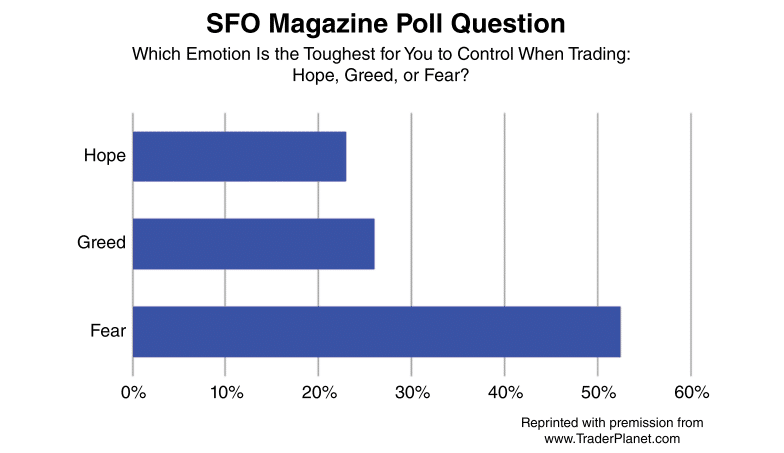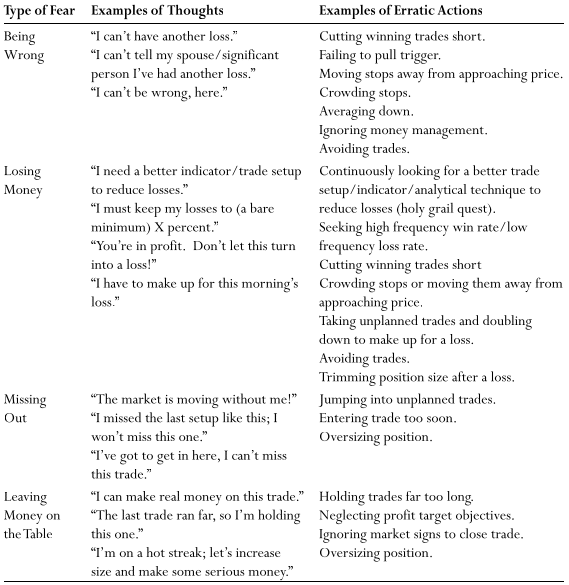
「Trade Mindfully」を読む(3)第2章
Chapter 2
Strong Emotions in Trading
トレードにおける激しい感情
One surprising finding was that all successful traders came to realize that being uncomfortable when trading is okay. The traders he interviewed—-some with over 20 years of trading experience—-were “never really all that comfortable in their trading chair.” They still had doubts, still had worries, and still experienced anxiety and fear. They felt the stress of trading and yet found that they could still make good, profitable decisions while feeling uncomfortable. Although these successful traders learned to “get comfortable with their discomfort, ”the point is that they all experienced discomfort in the form of worry, doubt, and sometimes fear. The habit they created for themselves was not to try and get rid of fear and discomfort, but to keep fear and discomfort from disrupting their market judgments and trading decisions.
驚くべき発見のひとつは、成功しているトレーダーはみな、トレード中は居心地が悪くても構わないと考えるようになったということだ。彼がインタビューしたトレーダーたちの中には、20年以上のトレード経験を持つ者もいたが、「トレーディング・チェアに座っているときは決して快適ではなかった」。彼らは依然として疑念を抱き、心配事を抱え、不安や恐怖を経験していた。彼らはトレードのストレスを感じながらも、不快感を感じながらも、利益を生む良い決断ができることに気づいたのだ。成功したトレーダーたちは「不快感を心地よく感じる」ことを学んだが、重要なのは、彼らは皆、心配や疑い、時には恐怖という形で不快感を経験していたということだ。彼らが自分で作り出した習慣は、恐怖や不快感を取り除こうとすることではなく、恐怖や不快感が市場分析やトレード判断を乱さないようにすることだった。
Successful traders eventually come to accept that trading will never be a totally comfortable pursuit. Because trading involves information that is incomplete and trade situations that are unique each time they arise, there is always a level of uncertainty and, thus, there will always be a level of psychological discomfort in taking and managing a trade.
成功しているトレーダーは最終的に、トレードは決して完全に快適な追求ではないことを受け入れるようになる。トレードには不完全な情報と、その都度ユニークなトレード状況が含まれるため、常に不確実性が存在し、したがって、トレードを行い、管理することには常に心理的な不快感が伴う。

Confidence isn’t the absence of fear; it’s the knowledge that you can perform your best in the face of stress and uncertainty.
1.間違った判断をするのが恐い Fear of Being Wrong
The fear of being wrong may be the biggest trading fear. No one likes to be wrong. It pulls our ego in. Many times, traders will admit that being wrong is one of the toughest fears for them to overcome. The fear of being wrong can cause erratic trading actions such as holding losing trades far too long, cutting winning trades short, moving stops, adding to losing positions, or jumping into the market in unplanned trades.
間違うことへの恐怖は、トレードにおける最大の恐怖かもしれない。誰も自分が間違っていることを好まない。それは私たちのエゴを引きずり下ろす。多くの場合、トレーダーは間違いを克服するのが最も困難な恐怖の一つであることを認めるだろう。自分が間違っているのではないかという恐怖が、負けトレードを長く持ちすぎたり、勝ちトレードを短く切り上げたり、ストップを動かしたり、負けポジションを増やしたり、無計画なトレードで市場に飛び込んだりといった不安定なトレード行動を引き起こす。
2. 損するのが恐い Fear of Losing Money
No one likes to lose money, but it is an inescapable part of the trading game. There is no method that has ever been developed that doesn’t lose money some of the time. The simple reason for this is that trading in all of its various forms is a probabilistic endeavor. This means that for any given trade that sets up, there is a probability that it will be a winner, and there is also a probability that it will turn out to be a loser. If our trade setup has a greater expectancy of winning over time, then we will be profitable trading that setup. Nevertheless, there will always be losing trades, the frequency of which will be based on the historical probabilities of the trade setup, assuming those probabilities hold into the future. Many traders understand this intellectually, but they still find, when in a trade or about to pull the trigger to enter a trade, their feelings take over and they are averse to loss. Loss aversion is a significant psychological hurdle for traders to overcome even though loss is a natural part of the trade setup probabilities. Loss aversion promotes irrational actions of cutting trades prematurely and holding onto losing trades—both actions done in the service of avoiding loss, not what is best for the trade. Such actions reflect a futile attempt to override the probabilistic law of trading.
誰も損をするのは好きではないが、トレーディング・ゲームでは避けられないことだ。これまでに開発された手法の中で、損失を出さないものはない。理由は単純だ。トレードはそのさまざまな形態のすべてにおいて、確率的な業務だからである。つまり、どのようなトレードであっても、それが勝ちなる確率もあれば、負けになる確率もある。トレードのセットアップが長期的に勝つ可能性が高ければ、そのセットアップをトレードして利益を得ることができる。とはいえ、負けトレードは常に存在し、その勝率はトレード・セットアップの過去の確率と、その確率が将来も維持されるという仮定に基づく。多くのトレーダーはこのことを知的には理解しているが、それでもトレード中やいざエントリーしようとするときに、感情に支配され、損失を嫌ってしまう。損失回避はトレーダーにとって克服すべき重要な心理的ハードルである。損失回避は、トレードを早々に切り上げたり、負けトレードを持ち続けたりする非合理的な行動を助長する。このような行動は、トレードの確率的法則を覆そうとする無駄な試みである。
2.機会損失が恐い Fear of Missing Out
The fear of missing out is an aspect of fear that can cause traders to jump into unplanned trades. A trader sees the market begin to move and impulsively takes a trade.
トレーダーが無計画なトレードに飛びつく原因となるのが、「取りこぼすことへの恐怖」である。トレーダーは市場が動き始めたのを見て、衝動的にトレードを行う。
Another signal that the fear of missing out is present is the tendency to enter trades too early.
機会損失への恐怖のもう一つの兆候は、エントリーが早すぎる傾向にあらわれる。
3.利益を取りこぼすのが恐い Fear of Leaving Money on the Table
Please notice that the thoughts associated with the underlying fear have nothing to do with the market action. They are not objective thoughts about the trade or its management. Although they seem at the time to be directed at the trade, they are not. They are reflecting—-and, therefore solely about-—the trader's internal state.
根底にある恐怖に関連する思考は、市場の動きとは何の関係もないことに注意してください。それらはトレードやその管理に関する客観的な考えではない。その時点ではトレードに向けられているように見えるが、そうではない。それらはトレーダーの内的状態を反映したものであり、したがって、もっぱらトレーダーの内的状態に関するものである。
When emotions dominate our decision making, we become subject to emotional hijackings—-episodes where your trading actions are completely emotion driven. Such states are experienced by high levels of arousal, intense emotions, and an inability to focus on anything but a narrow range of objects—-usually current price ticks and indicator fluctuations. It is also important to recognize that, when in this state, actions become rigid and restricted to a narrow range of patterned responses. As seen in many of the brief trader case examples, traders seem to be able to take only limited actions: cut a winning trade short, jump into a trade, fail to pull the trigger, persist in holding a trade, and other singular actions. They are unable to initiate more appropriate trading actions. When the hijacking is over, you feel as if something had possessed you and you were not quite in control of yourself.
感情によって意思決定が支配されると、私たちは感情にハイジャックされる。このような状態は、高いレベルの興奮、激しい感情、そして狭い範囲の対象(たとえば、眼の前のローソク足の上げ下げやインジケーターの変動)以外に集中できなくあってしまう。この状態にあるとき、行動は硬直化し、パターン化された狭い範囲の反応に制限されることを認識することも重要である。さまざまな報告によれば、トレーダーは限られた行動しかとれない。勝ちトレードを短く切り上げる、トレードに飛び込む、引き金を引かない、トレードを持ち続ける、その他の特異な行動などである。より適切なトレードを開始することができないのだ。ハイジャックが終わると、何かに憑りつかれたように感じ、自分自身が制御不能に陥っていたと実感するのだ。
心の知能指数 EQ Emotional Intelligence
When under the spell of an emotional hijacking, we lose all semblance of emotional intelligence.
感情をハイジャックされ乗っ取られると、EQは完全に失われてしまう。
EQの特徴
■ Recognize and assess emotions—both in oneself and in others.
■ Integrate the information expressed by emotions in decision making.
■ Understand the meaning behind emotions.
■ Conscientiously manage oneself.
■ 自分と他人の感情を認識し、評価する。
■ 意思決定において、感情によって表現される情報を統合する。
■ 感情の背後にある意味を理解する。
■ 意識的に自己管理する。
Basic EQ skills begin with the ability to recognize and evaluate emotions. This includes being able to identify emotions as a feeling state, how they may affect one physically, and also being aware of the thoughts generally associated with certain emotion.
EQの基本的なスキルは、感情を認識し評価する能力から始まる。これには、感情を感情の状態として認識できること、その感情が身体的にどのような影響を与えるかを認識できること、そして一般的に特定の感情に関連する思考を認識できることが含まれる。
As much as it may seem paradoxical and contrary to what you might assume, being able to manage oneself is not about controlling emotions as much as it is about being open to feelings, including strong emotions.
逆説的に思えるかもしれないし、あなたが思い込んでいることとは反対に思えるかもしれないが、自己管理ができるようになるとは、感情をコントロールすることではなく、強い感情も含めて感情にオープンになることなのだ。
We want to develop the first mental skill of emotional intelligence and be able to recognize it when it arises. In order to do this we need to clarify it. What happens to you when you become afraid or have another strong emotion? Pause a moment and think about this. Again, it helps to be clear on what we confront.
私たちは、EQの基本的メンタル・スキルを身につけ、EQが生じたときにそれに気づくことができるようになりたい。そのためには、それを明確にする必要がある。恐怖を感じたり、別の強い感情を抱いたりしたとき、あなたにはどのような変化が生じるか?少し立ち止まって考えていただきたい。何に直面しているのかを明確にすることが助けとなる。
If we can clarify the signs and symptoms of fear, not only do we understand better what it is we are dealing with, but we put ourselves into a position where we can recognize it early on. We have a much better chance of doing something constructive about it as it is just beginning to arise; we have less chance to act positively when we are already hijacked by it.
恐怖の兆候や症状を明確にすることができれば、自分が対処しているものが何であるかをよりよく理解できるだけでなく、恐怖に早い段階で気づくことができる状態に自分を置くことができる。恐怖が生じ始めたばかり段階で、建設的な行動をとれる可能性がはるかに高くなるのだ。
トレードにおける感情に対処するには
EQを高める努力をするしかないってこと
そのためには
自分の感情(恐怖とか)に目をつむるのではなく
むしろ目を見開いてその感情に向き合うこと
自分自身の感情と身体的兆候を把握すること
怒りの感情はどんな身体的変化を起こすのか?
恐怖を感じると体はどう反応するのか?
個人差があるから 自分のクセを自分で知っておくこと
焦り始めているぞ
腹が立ってきたぞ
怖くなってきたぞ
などなど冷静に客観的に診断できると
それらの感情にハイジャックされることを
防ぐ助けとなる

